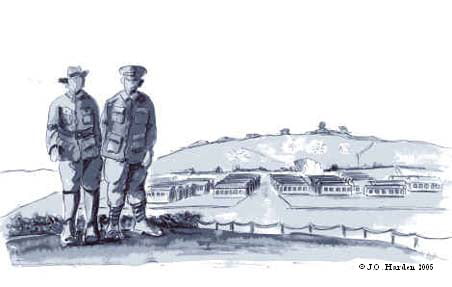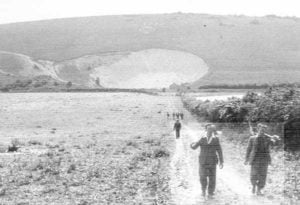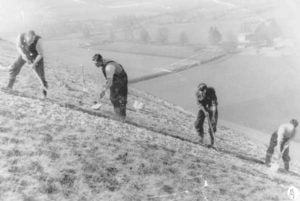
Dad’s Army – A Local Tale
When in the early days of the Second World War, with the threat of invasion looming ever closer and nationwide units of Local Defence Volunteers were formed (later to become the Home Guard), a unit in Fovant was born and dedicated to defending the locality, come what may.
Following the end of hostilities, the members of this local unit gathered in their Home Guard Headquarters – the parlour of the local inn, the Pembroke Arms – to discuss what could be done to fill the vacuum in their activities caused by disbandment of their unit. Your readers not familiar with it may care to read of the scheme which emerged.
It is widely known that during the First World War of 1914–18 many hundreds of acres of the farmlands lying below the downs, from Sutton Mandeville to the west, where the Army Post Office was located, and toward Barford St. Martin to the east, were the sites of very extensive Army training and transit camps accommodating and training troops of many well known regiments prior to service on the Western Front. It was during their service here that men of various British and Commonwealth regiments carved their crests in the chalk downs above the camp areas. After that war and over the years pre-1939, these emblems, of which there were many more than you see today, had gradually deteriorated and during the Second World War were allowed to completely disappear from view. To the hopefuls of the ex ‘Dad’s Army’ unit what better task than to try to restore the badges, which after all were a memorial to the many young men who left here for the Western Front never to return? Accordingly, a band of some twenty five ex-Home Guarders was formed under the supervision of the principal landowner (their erstwhile Home Guard Captain) and the Fovant Postmaster, and named themselves The Fovant Home Guard Old Comrades Association.

 Work was promptly commenced in spare time and at weekends to trace and restore those badges found to be still faintly discernable. A mammoth task faced them, working with difficulty on extremely steep hillsides with only hand tools to restore emblems, some of which are many hundreds of square metres in area.
Work was promptly commenced in spare time and at weekends to trace and restore those badges found to be still faintly discernable. A mammoth task faced them, working with difficulty on extremely steep hillsides with only hand tools to restore emblems, some of which are many hundreds of square metres in area.
In the years immediately following the Second World War complete restoration was achieved on eleven badges along the side of the Fovant Down which are seen today.
After some years, the Old Comrades Association was renamed The Fovant Badges Society which exists solely for the purpose of continuous maintenance of their predecessors dedicated work. For many years and up to the present time various regiments associated with their crests have sent annual working parties and/or cash donations to help with the Society’s aims, but because largely due to present defence cuts etc., such help has drastically dwindled. The result is that the major part of costly maintenance work can only be done with paid labour.
Some income, particularly in summer months is derived from publications which are purchased mainly by the many people from around the country, and indeed the world, who travel the A30 London–Penzance main road using the viewing lay-bys and donating into a collecting box sited there. Further income is generated by membership subscriptions. The Society has been much encouraged over the years by the enormous interest of so many people throughout this country and various parts of the world, many of them had relatives who served here.
Because constant attention needs to be given to the upkeep of these memorials, sadly the incomes described above are alone insufficient to continue to maintain them in reasonable condition. It is now becoming apparent that unless some means of augmentation of the Society’s income to replace the lost regimental help is forthcoming the future upkeep is in grave doubt. It would be a sad end to what is without doubt a unique memorial not only to the many who left here to die for their country, but also to the efforts of those dedicated people who restored the badges and to those who through the years have continued to preserve them to date.
K.W.
1993
Content last updated
5 January 2007
